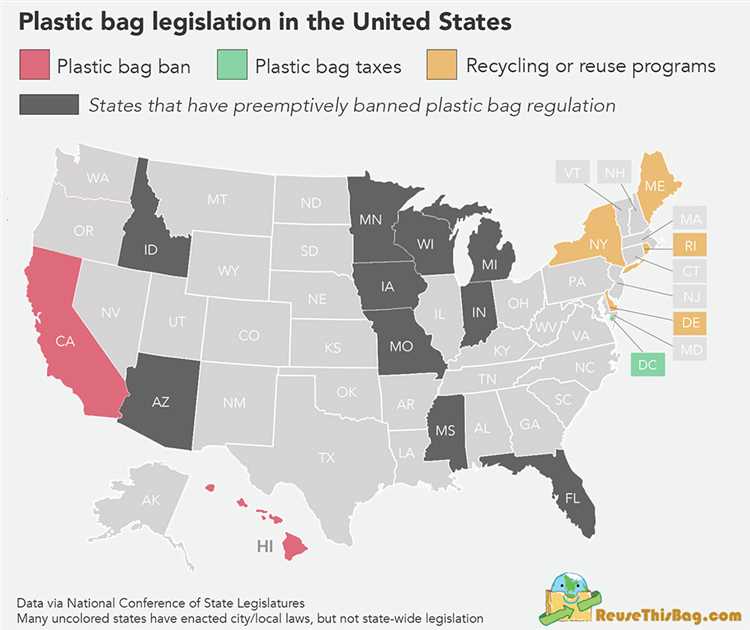
Plastic bags have long been a hot topic of debate when it comes to environmental conservation. Their non-biodegradable nature and the harmful impact they have on ecosystems have led to a worldwide push towards finding alternative solutions. However, long before the rest of the world caught on to the dangers of plastic bags, one state took the initiative to ban them.
California, a pioneer in environmental legislation, became the first state in the United States to ban single-use plastic bags in 2014. This landmark decision was a significant step towards reducing plastic waste and protecting the environment. The law aimed to encourage consumers to switch to reusable bags and prompted other states to reevaluate their own stance on plastic bag usage.
The ban on plastic bags in California received both praise and criticism. Advocates believed it was a necessary step towards combatting pollution and preserving natural resources. However, opponents argued that the ban was an unnecessary intrusion on individual freedom and convenience.
Regardless of the controversy surrounding the ban, California’s decision marked the beginning of a movement that has since spread to other states and countries. Today, numerous states in the US have implemented similar bans, and many other countries around the world have followed suit. The ban on plastic bags in California serves as an important milestone in the ongoing battle against plastic pollution.
- Background information on plastic bags and their environmental impact
- Environmental impact of plastic bags
- Efforts to reduce plastic bag pollution
- Growing global concern about plastic pollution
- The need for legislative action
- Which state banned plastic bags first?
- Environmental Benefits of Banning Plastic Bags
- Conclusion
- The first state to implement a plastic bag ban
- Q&A:
- Which state was the first to ban plastic bags?
- When did California ban plastic bags?
- What is the purpose of banning plastic bags?
- How do plastic bags harm the environment?
- Are there any exceptions to California’s plastic bag ban?
Background information on plastic bags and their environmental impact
Plastic bags are a widely used type of packaging, commonly made from polyethylene, a durable and lightweight material. These bags have become popular due to their convenience and versatility, used by consumers for various purposes such as carrying groceries, storing items, and disposing of waste. However, despite their practicality, plastic bags are also one of the major contributors to environmental pollution.
Environmental impact of plastic bags
The production and disposal of plastic bags have significant negative effects on the environment. Firstly, the manufacturing process of plastic bags requires large amounts of natural resources, including petroleum, water, and energy. The extraction of petroleum and the production of plastic contribute to air and water pollution, greenhouse gas emissions, and depletion of non-renewable resources.
Additionally, plastic bags are not easily biodegradable. Instead, they photodegrade, which means they break down into smaller and smaller pieces when exposed to sunlight. These tiny plastic particles, known as microplastics, can be ingested by wildlife and enter the food chain, posing threats to marine animals, birds, and human health.
Efforts to reduce plastic bag pollution
Recognizing the detrimental impact of plastic bags on the environment, many governments and organizations have implemented regulations and initiatives to reduce their usage. One of the most effective measures is the banning or restricting the use of plastic bags. By phasing out plastic bags, governments aim to encourage consumers to switch to reusable bags made from sustainable materials like cotton or jute.
Several states in the United States, including California, Hawaii, and New York, have implemented plastic bag bans, with other states considering similar measures. Internationally, countries like Kenya, Rwanda, and Bangladesh have also introduced strict regulations on plastic bag usage.
Moreover, awareness campaigns, education initiatives, and recycling programs have been launched to educate consumers about the environmental impact of plastic bags and promote more sustainable alternatives. Through these combined efforts, it is hoped that the excessive consumption and disposal of plastic bags can be curbed, leading to a cleaner and healthier environment for future generations.
Growing global concern about plastic pollution
Plastic pollution has become a global issue of increasing concern. The exponential increase in plastic waste over the past few decades has led to devastating consequences for the environment, wildlife, and human health.
Plastic pollution is a result of the unsustainable production, use, and disposal of plastic products. The convenience and versatility of plastic have contributed to its widespread use in various industries. However, the durability of plastic also means that it can persist in the environment for hundreds of years, leading to long-lasting pollution.
The consequences of plastic pollution are far-reaching. Marine life, in particular, suffers greatly from plastic waste. Millions of marine animals are killed each year due to entanglement in plastic debris or ingestion of plastic particles, causing harm to their digestive systems and leading to starvation. Additionally, plastic pollution affects the quality of water bodies, with microplastics entering the food chain and posing a potential risk to human health.
Awareness about the detrimental effects of plastic pollution has grown exponentially in recent years, leading to increased efforts to address the issue. Many countries and communities around the world have implemented measures to reduce plastic waste, such as banning single-use plastic items, promoting recycling, and encouraging the use of reusable alternatives.
The first state to ban plastic bags in the United States was California. In 2014, California implemented a statewide ban on single-use plastic bags, which has since been adopted by many other states in the country. This move was aimed at reducing the significant amount of plastic waste that ends up in landfills and waterways, and supporting the shift towards more sustainable alternatives.
Efforts to combat plastic pollution extend beyond national borders. International organizations, governments, and environmental activists are working together to raise awareness, promote sustainable practices, and advocate for policy changes to reduce plastic waste.
Addressing plastic pollution requires a multi-faceted approach, involving individuals, businesses, governments, and the global community as a whole. By reducing our reliance on single-use plastics, promoting recycling and proper waste management, and supporting initiatives that promote sustainable alternatives, we can make a collective effort to combat plastic pollution and protect the planet for future generations.
The need for legislative action
The increasing environmental concerns caused by the massive amounts of plastic waste have led to the need for legislative action. Plastic bags, in particular, have become a significant environmental hazard. They are responsible for polluting the oceans, harming wildlife, and creating a burden on landfills.
Many states in the United States recognized the urgency of addressing this issue and took action to ban or regulate the use of plastic bags. The first state to do so was California, which implemented a statewide ban on single-use plastic bags in 2014.
The ban on plastic bags in California was a response to the alarming increase in plastic pollution and its negative impacts on the environment. It was also driven by the fact that plastic bags are not biodegradable and remain in the environment for hundreds of years.
The legislative action in California sparked a domino effect, and other states followed suit. States like Hawaii, Rhode Island, and Oregon also implemented bans on plastic bags, recognizing the need to reduce the use of this harmful material.
The importance of legislative action is further emphasized by the fact that plastic bags are not only detrimental to the environment but also pose a threat to human health. Studies have shown that plastic bags release harmful chemicals when they break down, contaminating the soil and water sources.
Moreover, the production of plastic bags consumes significant amounts of fossil fuels, contributing to greenhouse gas emissions. By banning plastic bags, states can reduce their reliance on fossil fuels and take a step towards a more sustainable future.
Overall, the need for legislative action to ban plastic bags has emerged from the growing environmental concerns and the desire to protect our planet and future generations. By implementing these bans, states are taking a proactive approach in reducing plastic waste and promoting sustainable practices.
In conclusion, the first state to ban plastic bags was California, starting a trend that other states have followed in order to address the environmental and health hazards caused by plastic bags.
Which state banned plastic bags first?

With the increasing concern over environmental impact, many states in the United States have taken action to reduce the use of plastic bags. However, the state of California holds the distinction of being the first state to ban single-use plastic bags.
In 2014, California enacted a law that prohibited large grocery stores from distributing plastic bags. The law later expanded to include smaller grocery stores, pharmacies, and convenience stores in 2016.
California’s ban on plastic bags was a significant milestone in the movement to reduce plastic waste, as it set a precedent for other states to follow. Over the years, several other states, including Hawaii, New York, and Oregon, have implemented their own bans on plastic bags.
While the ban on plastic bags has faced some controversy and pushback, it is undeniable that it has had a positive impact on the environment. By reducing the consumption of single-use plastic bags, states are helping to decrease litter, protect wildlife, and promote sustainable practices.
Environmental Benefits of Banning Plastic Bags

The ban on plastic bags has resulted in a number of environmental benefits, including:
- Reduction in litter: Plastic bags are one of the most common litter items, and by banning them, states are reducing the amount of plastic waste on streets, in waterways, and in natural habitats.
- Protection of wildlife: Many marine animals mistake plastic bags for food, leading to ingestion and entanglement. Banning plastic bags helps safeguard marine life and protect ecosystems.
- Promotion of reusable alternatives: The ban on plastic bags encourages the use of reusable bags, such as cloth or canvas, which reduces waste and conserves resources.
Conclusion
California paved the way for other states with its pioneering ban on plastic bags. By taking this step, California set an example for other states to follow in order to protect the environment and promote sustainable practices in everyday life.
The first state to implement a plastic bag ban

In an effort to reduce plastic pollution and promote sustainability, California became the first state in the United States to implement a statewide ban on single-use plastic bags. The ban was signed into law by Governor Jerry Brown on September 30, 2014, and went into effect on July 1, 2015.
Prior to the statewide ban, individual cities and counties in California had already started taking action by implementing their own bans on plastic bags. The cities of San Francisco and Los Angeles were among the first to establish plastic bag bans in 2007 and 2010, respectively.
The ban in California prohibits large grocery stores, pharmacies, and other retailers from providing single-use plastic bags to customers. Instead, these businesses are required to offer reusable bags or charge a small fee for paper bags. The goal of the ban is to encourage consumers to bring their own reusable bags when shopping and to reduce the overall consumption of single-use plastics.
Since California’s implementation of the ban, several other states in the US have followed suit and enacted their own plastic bag bans. These include Oregon, Washington, Hawaii, New York, and Connecticut. Additionally, many countries around the world have also implemented similar bans in an effort to combat plastic pollution and protect the environment.
The move towards banning plastic bags reflects a growing awareness of the harmful effects of single-use plastics on the environment and the need for more sustainable alternatives. By reducing the use of plastic bags, states and countries can make a significant impact in reducing plastic waste and preserving the health of ecosystems.
Q&A:
Which state was the first to ban plastic bags?
California was the first state to ban plastic bags.
When did California ban plastic bags?
California banned plastic bags in 2014 with the passage of Senate Bill 270.
What is the purpose of banning plastic bags?
The purpose of banning plastic bags is to reduce litter, protect wildlife, and promote a shift towards more sustainable alternatives.
How do plastic bags harm the environment?
Plastic bags harm the environment by littering streets, polluting waterways, and posing a threat to wildlife that can get entangled or ingest them.
Are there any exceptions to California’s plastic bag ban?
Yes, there are exceptions to California’s plastic bag ban. Some examples include bags used for certain types of produce, bags for prescription medication, and non-profit organizations distributing free food.